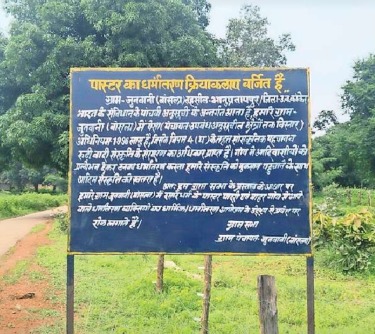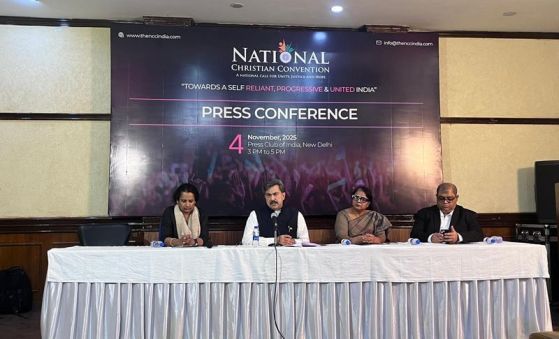
The Chhattisgarh High Court has refused to remove hoardings in eight villages of Kanker district that ban the entry of Christian pastors and converted Christians from outside, directing petitioners to first approach village councils and local authorities before seeking court intervention.
The court ruled on October 28 that hoardings aimed at preventing religious conversion through inducement or fraud cannot be called unconstitutional, but said petitioners must exhaust local remedies before approaching the High Court.
The villages of Kudal, Parvi, Junwani, Ghota, Ghotiya, Havechur, Musurputta and Sulangi have erected large hoardings at entry points stating that Christian pastors and converted Christians from other villages cannot enter for religious programmes or conversion activities. The notices say tribal people are being converted through allurement, which is damaging local culture.
Two petitions were filed challenging the hoardings. Digbal Tandi, a resident of Kanker district, and Narendra Bhawani, a local politician from Jagdalpur, told the court that when Christian pastors tried to visit family members, they were beaten by villagers and their houses were demolished. The restrictions have prevented Christians from entering villages they used to visit, the petitions stated.
The petitioners argued that the bans violate their constitutional rights to freedom of movement and freedom of religion. They said village councils have no power to stop people from entering villages, and that many Christian pastors and converts are themselves tribals.
The petitions stated that Christian pastors attempting to visit family and friends without any conversion motive were beaten by local people and had their houses demolished.
The state government defended the restrictions. Additional Advocate General Y S Thakur told the court that the hoardings were put up by village councils to protect tribal culture from what they call illegal religious conversions. He said people from outside were coming to villages and converting tribals by luring them with promises of curing diseases or providing help.
Thakur said a government circular issued in August was only meant to protect tribal culture and traditions, not to spread hatred against Christians. He pointed to rules under the Panchayat Extension to Scheduled Areas (PESA) Act that give village councils in tribal areas the power to protect local culture and customs.
The state also cited a 2023 incident in Narayanpur district where violence broke out over religious conversion, with tribals attacking a church and assaulting police officers including the district police chief.
Lawyers for the village councils said tribal villagers had complained that people from the Christian community were luring them on the pretext of curing diseases and illegally converting them. They argued the hoardings were a precautionary measure to prevent such activities.
Lawyers for the village councils also pointed out that Bhawani holds the post of City President of the Chhattisgarh Janta Congress Jogi and has six FIRs filed against him, suggesting he had not approached the court with clean hands.
Chief Justice Ramesh Sinha and Justice Bibhu Datta Guru, hearing the case, said the hoardings appear to be precautionary measures by village councils to protect tribal interests and local culture.
The court referred to a 1977 Supreme Court judgment that upheld laws banning religious conversion through force, fraud or inducement. The Supreme Court had ruled that the constitutional right to propagate religion does not include the right to convert another person, especially through inducement or pressure.
“In view of the above observations made by the Apex Court, the installation of the hoardings for preventing forcible conversion by way of allurement or fraudulent means cannot be termed as unconstitutional,” the court said.
However, the court did not fully decide whether the specific hoardings were constitutional or not. Instead, it disposed of the petitions on the ground that the challengers had not first approached local authorities as required by law.
Under PESA rules, anyone affected by a village council decision must first appeal to the village council itself. If not satisfied, they can then appeal to the Sub Divisional Officer, a district-level official. Only after going through these steps can they approach the High Court.
“A party must firstly exhaust the statutory alternative remedy available before approaching the High Court seeking redressal of any grievance,” the court said.
The court told the petitioners they are free to use these local remedies. It also said anyone who fears for their life or safety can seek police protection. The court clarified that its observations would not affect the petitioners’ case if they do pursue local remedies. However, it ordered that the security deposit paid by the petitioners be forfeited.
The case is the latest in a series of legal battles over religious restrictions in Chhattisgarh’s tribal areas. In September, the Progressive Christian Alliance had filed a similar petition, which was withdrawn to add village councils as parties to the case.
According to the Religious Liberty Commission, there were 86 incidents against Christian communities in Chhattisgarh between January and July this year. These included the arrest of two Catholic nuns and various incidents involving pastors.
The restrictions have been expanding. On September 7, leaders from 20 villages held a meeting in Sulgi village and passed similar resolutions. Sulgi has also put up entry restriction boards, with villagers citing concerns about 16 local families who converted to Christianity.
In early August, the Sanatan Samaj, a Hindu organization, held a demonstration in Bhanupratappur demanding government action against Christian activities.
The state government has announced plans to strengthen the Chhattisgarh Freedom of Religion Act, 1968, which bans conversion through force, fraud or allurement.
The petitioners must now decide whether to approach village councils for reconsideration, go through the administrative appeal process, or challenge the ruling in a higher court. The hoardings remain in place.




